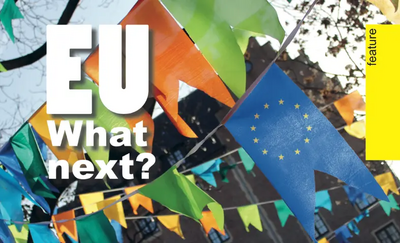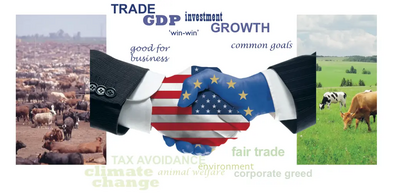EU – what next? ( Chris Davies sets out the challenges for the next European Parliament )


You can retreat over the moat and pull up the drawbridge behind you, but you will still not be able to stop the polluted air from gaining access to the castle, you will still be dependent for survival upon the purity of the groundwater, and at some point you will still be dependent upon the actions of others if your needs are to be met.
This is the dilemma for UKIP and their Eurosceptic fellow travellers. Pollution often pays no respect to national boundaries. The task of dealing with environmental problems reflects our interdependence, which is why WWF estimates that 80% of Britain's environmental laws are fashioned at EU level. It's a subject that the Eurosceptics generally prefer to avoid, and when they do speak out they often put themselves at odds with public sentiment by revealing their hostility to environmental protection measures in general.
There can be no doubt that EU legislation has stimulated environmental progress in our country and across the continent. Directives and regulations on air and water quality, chemicals and waste, climate and energy, have been transposed into UK law and applied by government and business. Even when Britain might have been expected to take its own initiatives, by cleaning up our rivers for example, the mere threat of being taken to the European Court of Justice for an infringement has had a wonderful effect in strengthening the hands of environmental ministers in their dealings with the Treasury.
Remember acid rain? In the 1980s it was a serious problem. Report after report demonstrated how rain affected by sulphur emissions, principally from coal power stations, was destroying forests and reducing agricultural output. Statues and public monuments were being eaten away by showers of dilute sulphuric acid. It was a classic transboundary problem with Britain amongst those countries branded as 'the dirty men of Europe'. EU environment legislation required that SO2 emissions be reduced. Power stations were equipped with desulphurisation equipment, expensively at first but the costs quickly fell. Emission levels have been reduced dramatically, especially in the older EU member states. These days it's rare to read anything about acid rain.
Political support for ambitious environmental legislation is easier to secure when times are good and money is flowing. This is not one of those times. The next generation of MEPs will include many whose views have been shaped by financial crisis and high unemployment. Their primary aim will be to keep down short term costs and maintain jobs in traditional industries. Evidence that environmental innovation and investment in more sustainable enterprises will produce even more employment in future will I fear often be disregarded. The next few years could prove heavy going for those of us seeking environmental improvement.
It is easy to get swept away if you try a direct crossing of a fast-flowing river, but swim with the flow and you may make your way safely enough, albeit more downstream that might be wished. In the next Parliament I will to try to break down some of the resistance to progress and forge alliances with those who have commercial and political interests in promoting environmental regulation and the setting of targets. I want to be able to celebrate the benefits of technological development and sustainable investments for business and employment. Let's be clear, there are enormous number of jobs that exist only because of the environmental requirements that already exist. I want to identify win-win opportunities that can benefit both business and the environment.
Top of the agenda will be Europe's climate and energy strategy. Our aim must be to deploy the instruments that can allow us to build a low carbon economy that is globally competitive. The two goals are equally important and can be mutually supportive, but the political debate is not helped by the lack of any kind of global agreement on tackling climate change. With the EU responsible for only 10% of the world's global warming emissions there is enormous reluctance by coal-dependent nations like Poland to set ambitious targets for CO2 reductions.
The European Commission has proposed a 40% reduction target compared to 1990 levels to be achieved by 2030. It wants the proportion of energy derived from renewables to rise to an EU average of 27%, but there will be big differences between the targets set for each country and governments will be asked to prepare plans to achieve the necessary CO2 reductions at lowest cost in whatever ways are best suited to their national circumstances. The objectives may not be ambitious by Liberal Democrat aspirations but given the pressure for them to be weakened I will not be displeased if we can hold the Commission's line.
A role for nuclear
I favour the technologically-neutral approach. Alongside renewables I want to see the development of carbon capture and storage to help industry as well as fossil fuel power generators reduce emissions to the atmosphere. I have come to recognise that there can be a role for nuclear power too. But it is energy-reduction that should be given much greater emphasis and should take pride of place in national strategies; it is, after all, by far the best means of achieving win-win outcomes.
The key decisions over the setting of targets will be made by EU heads of government in October. The Commission will then come forward with the legislative proposals needed to achieve the objectives, and it is then that MEPs will come into their own and have the opportunity to mount a challenge and shape the outcome.
Individual Influence
Never forget the importance of the individual. A new European Commission should take office by the end of this year. Commissioners are nominated by governments and allocated their role by the president after his or her confirmation by Parliament. Each nominee is subject to a 3-hour cross-examination by a committee of the MEPs following their subject and can take up their job only if the Parliament approves their appointment. It's a rather more demanding process than is required of new government ministers in Britain! Key roles to be filled include the portfolios for energy, climate action, enterprise, research and the environment, not to mention fisheries and agriculture.
The personality and political skills of these individuals can make an enormous difference. Can they promote their policies effectively? Can they command the confidence of colleagues, of ministers, and of MEPs? Can they forge the alliances necessary to secure success? A weak commissioner is likely to mean weak results.
Much primary environmental legislation is already in place. Inevitably then the Commission will rarely start with a blank sheet of paper but rather will be reviewing progress, assessing difficulties, and putting forward proposals to recast laws to achieve better compliance and perhaps raise standards. New air quality requirements will be proposed. Poor compliance with water quality legislation will have to be challenged. Targets for recycling are likely to be raised, while new proposals may be made to reduce the use of increasingly expensive resources by setting parameters by which progress must be measured. The EU's REACH chemicals legislation will have to be modified I suspect to reduce the compliance costs for manufacturers of chemicals on a small scale. As we learn by doing we may have to tweak the now much-reformed common fisheries policy to ensure that the measures adopted to rebuild fish stocks are not sometimes incompatible with commercial fishing practice. Firm proposals for measures to reduce the loss of biodiversity will be welcome.

A transatlantic trade treaty?
Yet it may not be an environmental measure but a trade one that gives rise to most dispute. In 2015 firm proposals for an EU-USA Transatlantic Trade & Investment Partnership could be put before EU governments and the European Parliament. It is claimed that creation of such a free trade area could add €120 billion to the value of Europe's economy but it will involve the setting of common standards in many areas. The EU's chief negotiator assures us that we have nothing to fear for he knows that MEPs will not approve a deal that weakens Europe's environmental protection, but critics fear that its provisions might enable litigants to persuade the Courts to sweep aside measures judged to be 'obstacles to trade'. As both environmentalists and strong supporters of free trade this could prove a sensitive challenge for Liberal Democrats.
Chris Davies was an MEP between 1999 and 2014. He was the Liberal Democrat environment spokesman in the European Parliament. For his work in helping to secure major reforms to the EU Common Fisheries Policy he won the 2014 'MEP of the Year' environment award.
© Copyright on the text of this article remains with the Chris Davies
© Copyright on all photographs / graphic images remains with Christian Vassie
This Article from Spring 2013 Challenge Magazine
